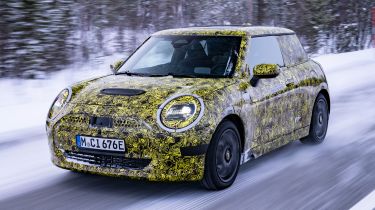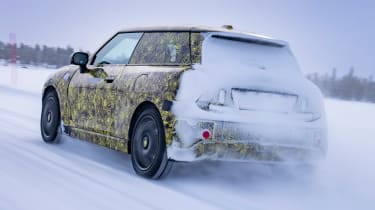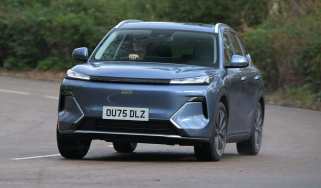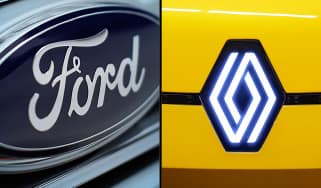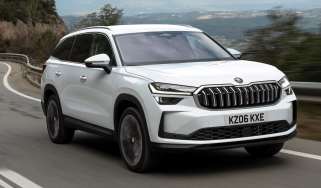New MINI prototype ride review
We get taken for a ride in the passenger seat of the new all-electric MINI Hatch as it starts to take shape ahead of its 2023 arrival
Eighteen months from now, MINI will introduce the fourth-generation version of one of Britain’s most popular cars - the MINI Hatch. However, for the Mk4 iteration of BMW’s take on the British icon, massive changes are coming - and Auto Express has been out to northern Sweden to sample the newcomer from the passenger seat.
The three-door version of the brand’s hatch will launch as a fully electric model on a new small car platform, developed in Europe by BMW specifically for the MINI brand. It will be built in China though, thanks to an agreement signed by MINI and Chinese car-making giant Great Wall. A petrol version of the MINI Hatch with a five-door option will also be offered, with the same exterior dimensions and styling, and produced at the brand’s plant in Oxford on a combustion-engined platform.
Here, we’re riding in the new electric model, which will go on sale in the second half of 2023. Official technical specifications on the new car are still under wraps, but Auto Express understands that two versions will be offered thanks to the flexibility that the new bespoke electric architecture allows.
An entry-level car with a battery offering around 40kWh of energy will kick things off, with a similar £27,000 starting price to the current MINI Electric. Power output will be similar too, at around 180bhp - but range should increase to around 186 miles on a full charge, making it a direct rival for the electric Fiat 500.
We’re riding in the more powerful, longer-range variant though. With a c. 50kWh battery on board, around 250 miles on a full charge will be possible. The electric motor powering the front axle delivers around 215bhp, and it’s this increased reach and flexibility that sets this new-generation car apart from the outgoing MINI Electric.
Before we climb on board with MINI engineer Klaus Bramer, we first get the chance to take in the car’s updated exterior dimensions. Former MINI boss Bernd Korber told Auto Express in 2019 that he wanted to make the MINI ‘mini’ again, but on first encounter, it’s clear that this more or less translates to a car with a similar footprint, but much improved packaging thanks to the new platform.
It’s ever so slightly shorter, but a longer wheelbase, flat floor and shorter overhangs mean that the new car makes more of its size when it comes to interior space. “You can drive longer ranges with it. It’s comfortable. You can also have passengers in the rear seat. It’s more spacious than the last versions,” claims Bramer, as we head out onto MINI’s frozen test track.
Winter testing is an essential part of any car’s development programme, not least an EVs when it comes to determining a minimum range value. Up here, in the freezing temperatures, how the car copes with the cold is assessed, while the slippery surface is used to calibrate the car’s stability and traction control systems.
“We search all over the world for the worst case scenarios,” says Bramer, “and then we make sure that our car works in these conditions.”
Work in hotter climates and high-speed calibration is yet to come, but alongside testing the systems in cold weather, ensuring that the new MINI has a playful side is high up Bramer’s to-do list.
“It is important for us that our fans like to drive it,” he says, while explaining that the new platform has enabled a more preferable centre of gravity, and a slight reduction in weight, too. Besides that, we have a larger wheelbase and wider track to make it more comfortable. With the centre of gravity we can make it more agile than the last one, it feels more playful.”
The more powerful car we are in will have a sportier set-up compared with the base model, and this is something that MINI’s engineers are currently finalising.
It’s not possible to fully gauge how darty and nimble the car is, but it takes the ice in its stride, changing direction happily on the slippery surface, with the new traction control system easily dealing with any wheelspin.
With another year and a half until it makes its debut, there’s still plenty to come, but Bramer isn’t phased by the upcoming challenges. “We have 18 months to go and right now it is driving pretty good,” Bramer added. “I’m pretty sure our customers will be happy with it.”
| Model: | MINI Electric Cooper SE |
| Price: | £32,000 (est) |
| Battery: | 50kWh (est) |
| Power: | 215bhp (est) |
| Transmission: | Single e-motor, front-wheel drive |
| Range: | 250 miles (est) |
| 0-60mph: | N/A |
| Top speed: | N/A |
| On sale: | 2023 |

